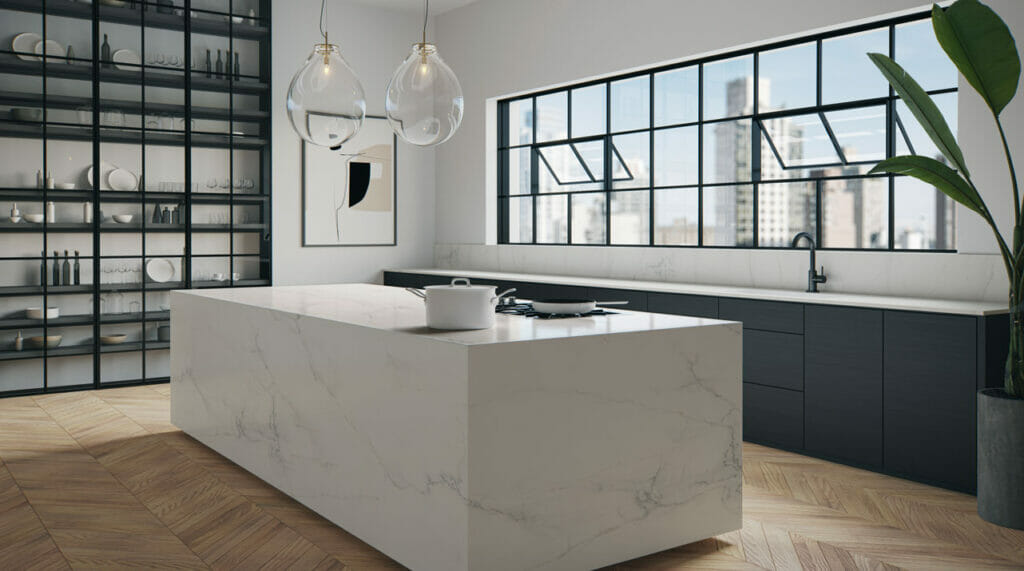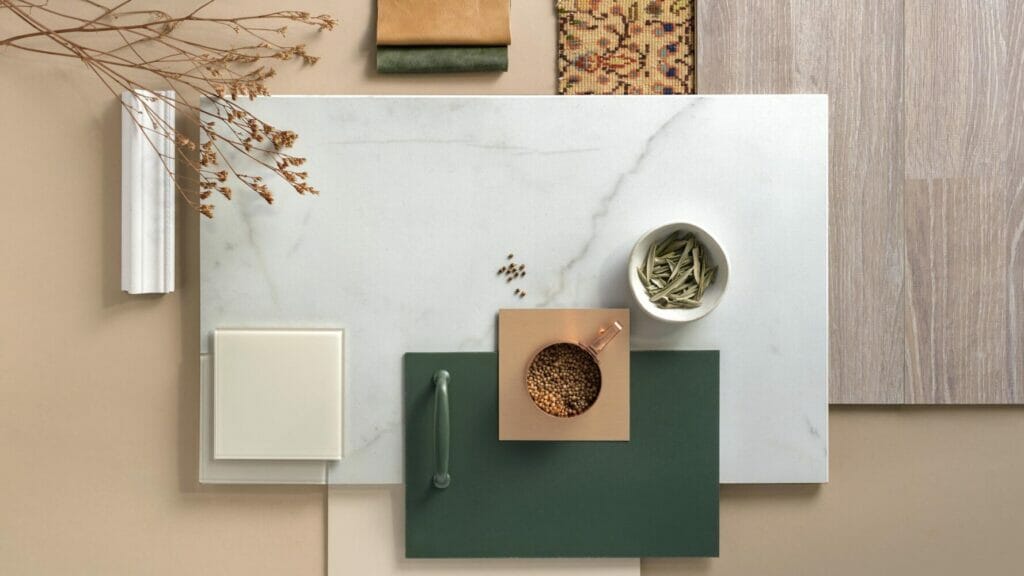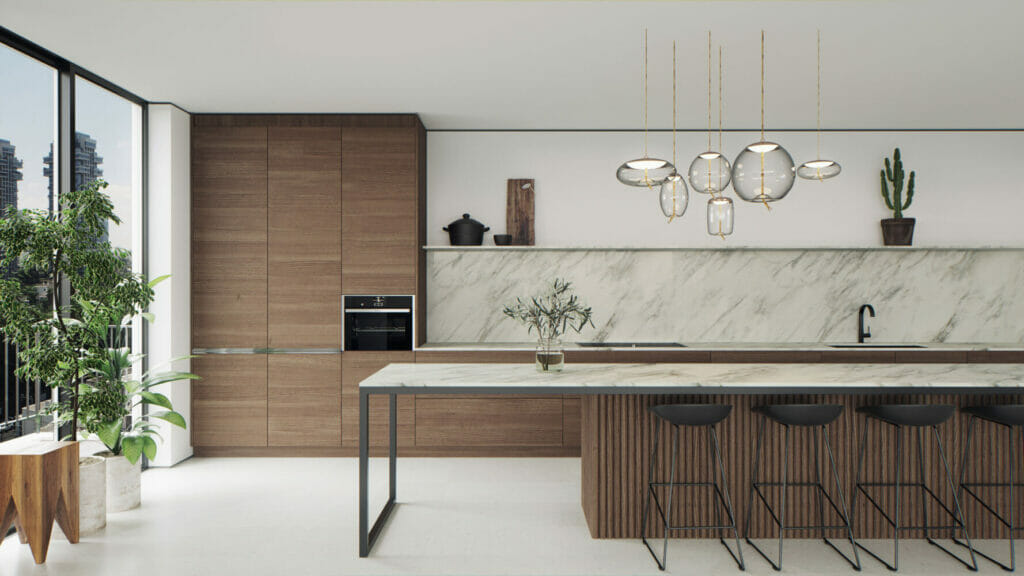Are Porcelain Countertops Heat-Resistant?
5 min read
When it comes to kitchen and bathroom countertops, homeowners normally look at natural stone materials like quartz. But recently, the trend has shifted in favour of another material: porcelain.
Porcelain is a fantastic option for homeowners who want to install a durable countertop in their kitchens. When it comes to porcelain, heat, scratches, and stains are rarely (if ever) an issue.
However, it’s not uncommon for homeowners to have questions about porcelain countertops.
One of the common questions that homeowners have is, “how much heat can porcelain withstand before getting damaged?”. Homeowners can continue reading to find the answer.

Porcelain is a trendy material that is used to create a broad range of everyday items, from tableware and decor, to tiles and other engineering applications. Lately, it’s gained popularity as a kitchen and bathroom countertop material because of its heat resistance, durability and strength.
Porcelain is made by mixing quartz, clay and feldspar under extreme heat. The manufacturing process gives porcelain impressive heat, scratch, and stain resistance, all of which are desirable characteristics for homeowners.
Porcelain is starting to overtake natural stone countertop materials because it’s stronger and more durable than many other countertop materials on the market. With this material, homeowners can feel confident knowing that their counters won’t sustain any damage, even with rigorous slicing, chopping, or dicing. That being said, the experts at Caesarstone highly suggest using a cutting board for every day use to prolong the lifespan of the product.
As mentioned earlier, porcelain countertops are trending in the interior design world thanks to their heat resistance.
However, plenty of homeowners still ask, “are porcelain countertops heat-resistant?”, and they’ll be glad to hear that porcelain can withstand extreme temperatures.
Generally, high-quality porcelain countertops can resist temperatures ranging from 1,200° F to 2,000° F.
Because it is fabricated in high heat over 2000° F, porcelain can easily hold its own against hot kitchen or bathroom environments. Its surface is resistant to damage after exposure or contact with hot pans and pots and won’t burn, smoke, or emit harmful substances.

Aside from porcelain’s heat resistance, it has a lot of properties that make it attractive to homeowners. But before fully committing to it, one needs to know its pros and cons.
As mentioned, porcelain is highly durable and, when used for kitchen or bathroom countertops, is sure to last for several years, if not decades. Porcelain’s rigid structure makes it more robust than other countertop materials, and its heat-resistant, stain-resistant, water-resistant, and fade-resistant properties all heavily contribute to its appeal.
Porcelain is non-porous, which means that its components are so tightly packed that air and water cannot move around it. It has a water absorption rate of 0.5%, which means that spills won’t be absorbed by the material and lead to damage over time.
Because of its low water absorption, the tendency for stains is also significantly reduced. Homeowners need not worry about acidic or dark-coloured liquids ruining their porcelain countertops’ surface.
Another reason why porcelain is gaining popularity is its versatility. Unlike natural stone materials, porcelain can be cut into much larger slabs. Whereas other materials come in smaller cuts and must be connected to create a larger surface, porcelain can be cut according to the required specifications. That means it won’t yield a gap or seam in the middle of the counter.
Despite having larger cuts, porcelain is surprisingly light—depending on the thickness. These lighter slabs can even be installed right on top of an existing countertop without trouble.
Further, porcelain offers a wide range of colour options, including dark, light, and neutral palettes, as well as various pigmentations and hues. Moreover, it can be personalized to imitate natural stone or to include intricate details, patterns, and textures.
Homeowners don’t need to worry about porcelain losing its colour, either. It’s generally fade-resistant, heat-resistant and does well under sun exposure, making it the perfect material for outdoor installations.
While porcelain is robust and durable, all countertop materials may chip or damage when not properly cared for. In case that happens in porcelain, its consistent structure will make the damage quite noticeable if not immediately remedied.
Porcelain can also be difficult to install because of its larger yet thinner cuts. Installing a porcelain countertop using DIY methods is not ideal. For the best results, homeowners should contact a professional, qualified installer.
Further, depending on their location, some homeowners may find it challenging to get their hands on porcelain countertops. Thankfully, more and more manufacturers, like Caesarstone, now produce porcelain countertops. Homeowners can visit Caesarstone’s “Where to Buy” page to find a nearby retailer or showroom.

Porcelain countertops are commonly found in kitchens and bathrooms. Porcelain is well suited for these spaces because of its non-porous, heat-resistant, and water-resistant properties.
Because of all its beneficial properties, porcelain is also rated for exterior use, meaning it has applications beyond the kitchen and bathroom. Homeowners can use porcelain for a garden kitchen island or outdoor bar. Thanks to the material’s ability to withstand the sun’s UV rays, homeowners don’t have to worry about the countertop fading or losing its colour over time.
It’s evident that porcelain is highly versatile and can be used practically anywhere.
Porcelain is quickly overtaking natural stone and is rising through the ranks as one of the best kitchen and bathroom countertop materials. Its strength and durability make it particularly attractive to homeowners, and they get the extra benefit of having an easy-to-maintain surface that will last them years.
Porcelain is a worthy investment for any homeowner. When they’ve decided that this is the material they want in their kitchen or bathroom, homeowners can order samples to help them visualize how different colours and patterns will look in their space.
{{ subtitle }}
{{ i.desc }}
{{ subtitle }}
{{ subtitle }}